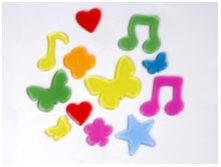
My experience on How NLP Has Influenced Me as a Teacher and Learner
Lauren Damas, Portugal
Lauren Damas is a teacher at British Council Porto, Portugal
E-mail: Lauren.Damas@pt.britishcouncil.org
Menu
The first time I heard of NLP
NLP books I often use in the classroom, and highly recommend
A poem I wrote after reflecting on how NLP has influenced my learning and teaching

The first time I came across NLP was in 2005 when I read Mario Rinvolucri’s article ‘NLP suits some people extremely well’ in the Modern English Teacher October 2005 issue. In this very interesting and awareness raising article, Mario Rinvolucri explores how different cultures and individuals respond to NLP.
I was curious then and wanted to know more about NLP as a potentially useful learning tool, particularly as I was reading on multiple intelligences at the time, and learning to implement these in my teaching so as to best meet the rich diversity of learners’ styles.
However, as soon as I began searching for information on NLP, I was a bit overwhelmed by what I found. What surprised me most were promises such as, ‘I can /I will make all your dreams –whatever they may be- come true’, usually in very short periods of time. It wasn’t even the notion of possibility/ potential or dreams becoming reality, but the ‘I can do it for you … and I will do the thinking for you …’ that I found rather disturbing. As a result of this initial experience, it took me some time to carefully consider my interest in knowing more on how to use NLP in the classroom.
As a teacher I hope that if there is one thing I can clearly transmit to my students is that they take responsibility for their learning and thinking, and that they use whatever they learn in ways that will make their life matter and meaningful in an accountable manner.
It was only in 2007 that I started to gradually integrate NLP-based activities in my teaching.
I have found the following books, ‘Handing Over’ and ‘In your Hands’ by Jane Revell and Susan Norman very useful and friendly to use. I like using the ‘guided mountain fantasy’ with exam classes and business students. I have found the psychomotor activities good fun, quick energizers and great for building rapport, particularly with younger learners. I have found the stories a valuable learning and teaching tool too.
Storytelling and the use of metaphor are key elements of NLP, and I have since then incorporated storytelling in my lessons, and the overall response from students has been positive and rewarding. I knew stories would work well with younger students from past experience, and was pleasantly surprised to find that adult learners also enjoyed storytelling. It is great to listen to adults actively engaged sharing their favourite stories or tales, and telling the class what these stories mean to them.
I have found Nick Owen’s book, ‘The Magic of Metaphor’ an invaluable resource when wanting to find stories that link with almost any topic or message I want to convey in a particular lesson.
I am very grateful to have come across Mario Rinvolucri’s and Judith Baker’s ‘Unlocking Self-Expression through NLP’ to which I frequently and loyally refer to. This book has become one of my favourite TEFL resources that has worked well for me and my learners on many occasions, and which I highly recommend!
Today, I perceive NLP as a natural follow-up on my interest in Multiple Intelligences, and in wanting to provide as much as possible a holistic multi-sensory learning environment to facilitate and make the learning process a rewarding and enjoyable experience. VAKOG (visual, auditory, kinaesthetic, olfactory, and gustatory), and the respect this principle has for individuals’ preferred learning styles and the learners themselves, appeal to my own experience of learning and teaching.
A BIG thank you to all who generously and responsibly share their experience on how to implement NLP-based activities to promote more effective and rewarding learning of English among learners. It has certainly enriched my teaching and learning, and I truly hope that of my students too!
What has NLP given me?
NLP
has helped me see
the better person I can be
the better world I too can help create
by making a positive and meaningful difference
NLP has awakened me to the wondrous magic of
imagination and creativity
and delighted me with its dynamic and generative reality
NLP has inspired me with renewed respect for
sameness and diversity
wholeness and integrity
NLP has enriched my life with
more choice and exciting opportunities
new dreams and liberating possibilities
NLP has challenged me
to be more authentic and take more responsibility
that is some of what NLP has given me

The NLP for Teachers course can be viewed here


|